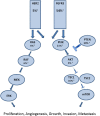Advanced Urothelial Carcinoma: Overcoming Treatment Resistance through Novel Treatment Approaches
- PMID: 23390417
- PMCID: PMC3565214
- DOI: 10.3389/fphar.2013.00003
Advanced Urothelial Carcinoma: Overcoming Treatment Resistance through Novel Treatment Approaches
Abstract
The current standard of care for metastatic urothelial carcinoma is cisplatin-based chemotherapy but treatment is generally not curative. Mechanisms of resistance to conventional cytotoxic regimens include tumor cell drug efflux pumps, intracellular anti-oxidants, and enhanced anti-apoptotic signaling. Blockade of signaling pathways with small molecule tyrosine kinase inhibitors has produced dramatic responses in subsets of other cancers. Multiple potential signaling pathway targets are altered in Urothelial carcinoma (UC). Blockade of the PI3K/Akt/mTOR pathway may prove efficacious because 21% have activating PI3K mutations and another 30% have PTEN inactivation (which leads to activation of this pathway). The fibroblast growth factor receptor 3 protein may be overactive in 50-60% and agents which block this pathway are under development. Blockade of multiple other pathways including HER2 and aurora kinase also have potential efficacy. Anti-angiogenic and immunotherapy strategies are also under development in UC and are discussed in this review. Novel therapeutic approaches are needed in UC. We review the various strategies under investigation and discuss how best to evaluate and optimize their efficacy.
Keywords: bladder cancer; chemotherapy; oncogenes; resistance mechanisms; urothelial cancer.
Figures

References
-
- Bahnson R. R., Becich M., Ernstoff M. S., Sandlow J., Cohen M. B., Williams R. D. (1994). Absence of immunohistochemical metallothionein staining in bladder tumor specimens predicts response to neoadjuvant cisplatin, methotrexate and vinblastine chemotherapy. J. Urol. 152, 2272–2275 - PubMed
-
- Bamias A., Dafni U., Karadimou A., Timotheadou E., Aravantinos G., Psyrri A., et al. (2012). Prospective, open-label, randomized, phase III study of two dose-dense regimens MVAC versus gemcitabine/cisplatin in patients with inoperable, metastatic or relapsed urothelial cancer: a Hellenic Cooperative Oncology Group study (HE 16/03). Ann. Oncol. [Epub ahead of print]. - PubMed
-
- Bellmunt J., Gonzalez-Larriba J. L., Prior C., Maroto P., Carles J., Castellano D., et al. (2011). Phase II study of sunitinib as first-line treatment of urothelial cancer patients ineligible to receive cisplatin-based chemotherapy: baseline interleukin-8 and tumor contrast enhancement as potential predictive factors of activity. Ann. Oncol. 22, 2646–265310.1093/annonc/mdr023 - DOI - PubMed
LinkOut - more resources
Full Text Sources
Other Literature Sources
Research Materials
Miscellaneous

